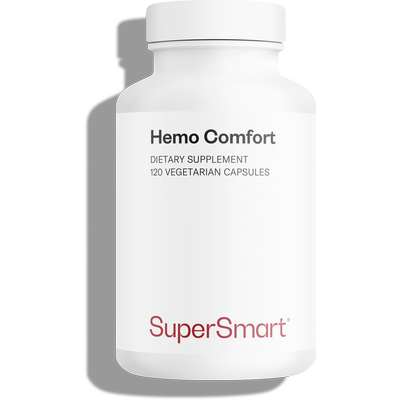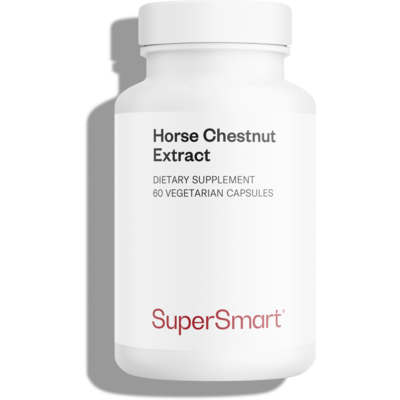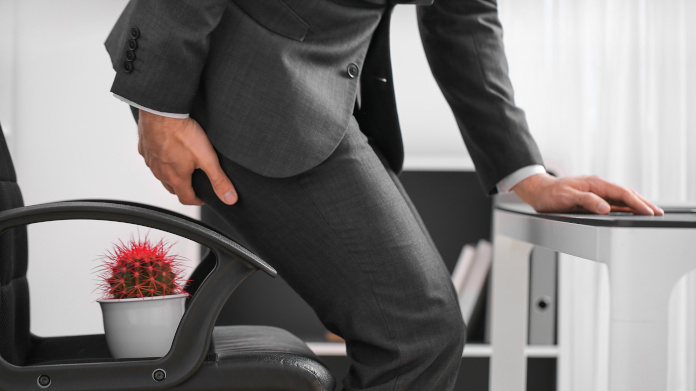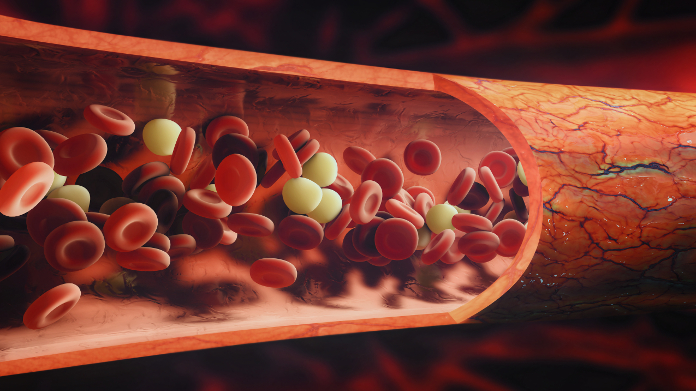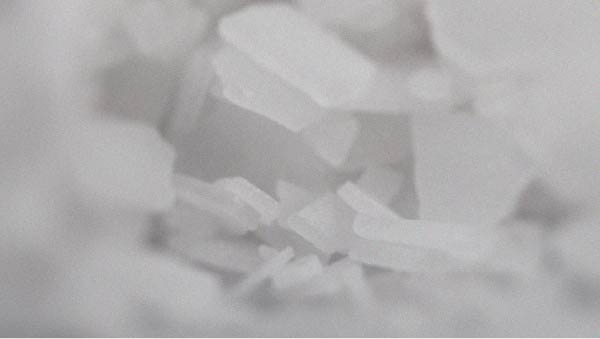Hemorrhoids – which foods should you avoid and which should you prioritise to obtain relief?
Pain, burning, or itching around the anus? If you’re prone to hemorrhoidal attacks, read on for a list of the foods to avoid and prioritise, as well as some tips for reducing the chances of them coming back.

Hemorrhoids and hemorrhoidal attacks : multiple causes
Hemorrhoids (also known as ‘piles’) are enlarged blood vessels either under the skin around the anus (external hemorrhoids) or inside the anal canal, under the mucous membrane (internal hemorrhoids).
What is commonly referred to as “having hemorrhoids” is therefore hemorrhoidal disease: irritation and swelling of these blood vessels.
The most common symptoms are itching, burning and/or pain in or around the anus. Hemorrhoidal attacks can cause severe pain and bleeding (1).
Causes of hemorrhoids
The main causes of inflammation of these blood vessels include:
- pregnancy, childbirth and the post-partum period, which are all conducive to the onset of hemorrhoids in women;
- aging, due to the loss of muscle tone in the perineum and anus;
- venous insufficiency, as stagnation of blood in the legs causes hemorrhoidal veins to swell;
- constipation, as straining to empty the bowels causes damage to blood vessels in this area;
- a sedentary lifestyle and excess weight, as well as lifting heavy items without motor control of the perineum;
- and finally, consuming alcohol and spicy food.
’No-go’ foods if you have hemorrhoids
Analysis of the causes of hemorrhoidal disease makes it easy to identify which foods to avoid in order to obtain relief (3):
- refined starches which encourage constipation: white rice, pasta and bread, as well as potatoes;
- spicy foods: chilli, curry, black pepper, mustard, etc, which promote irritation of the anus during defecation;
- alcohol and caffeine, which encourage dehydration, potentially causing hard stools that are difficult to pass, which aggravates hemorrhoids;
- fatty, salty and sugary foods in general: an excessively rich diet, with a high proportion of processed foods, unhealthy fats and added sugars, impairs intestinal transit and stool quality.
Priority foods for combatting hemorrhoidal episodes
In contrast, there are a number of foods to focus on in order to maintain the health of the blood vessels in this region:
- water: staying well-hydrated helps fight constipation. You need to drink at least 30 ml of water per kilo of bodyweight a day. For example, if you weight 70kg, you should drink at least 2.1 liters of water a day;
- high-fibre foods: fibre encourages transit by stimulating intestinal motility. Increase your intake of high-fibre fresh fruits and vegetables, but don’t go overboard to the point of causing diarrhea, as that too can increase irritation of hemorrhoids;
- whole grains and pulses: they increase frequency of bowel movements and improve stool consistency.
In short, eating a healthy, balanced diet is an effective way of fighting hemorrhoidal episodes.
Some tips to help prevent the discomfort of hemorrhoids
Finally, here are some excellent natural tips if you regularly suffer from inflamed hemorrhoids.
As a sedentary lifestyle and excess weight are common causes of hemorrhoids, it’s advisable to follow a weight-loss diet, as well as - and especially – to engage in regular exercise, even at a moderate level: walking, swimming, etc. (4).
Exercises to strengthen the pelvic floor (Kegels) can also be particularly effective at improving muscle tone and motor control of the anus.
Proper intimate hygiene of the anal area is also important for reducing hemorrhoidal pain. Gently cleanse the area using moist, unscented wipes, to reduce irritation.
Sitz baths do not really reduce hemorrhoid problems, but they can ease the discomfort they cause, which can be very helpful in an acute hemorrhoidal attack. In the case of inflamed hemorrhoids, sit in a sitz bath containing lukewarm water (around 40°C) for 10-15 minutes, 3 or 4 times a day.
Horse chestnut, meanwhile, has been used for thousands of years as a venotonic. And for good reason, as it contains aescin which reduces the permeability of the vein wall and maintains its tone, thus facilitating the return of blood to the heart, especially in superficial blood capillaries. That’s why horse chestnut supplements (such as Horse Chestnut Extract) are very often recommended for combatting hemorrhoids (5).
There are also synergistic formulations developed specifically to fight the discomfort of hemorrhoids, in which horse chestnut extract is combined with other active ingredients (one such example is Hemo Comfort).
It goes without saying that if you suffer a painful hemorrhoidal attack lasting more than 48 hours, consider consulting a doctor for advice on how to treat your hemorrhoids.
SuperSmart ADVICE
References
- SARDINHA, T. Cristina et CORMAN, Marvin L. Hemorrhoids. Surgical Clinics, 2002, vol. 82, no 6, p. 1153-1167.
- GAMI, Bharat, et al.Hemorrhoids-a common ailment among adults, causes & treatment: a review. Int J Pharm Pharm Sci, 2011, vol. 3, no Suppl 5, p. 5-13.
- CHUGH, Anmol, SINGH, Rajdeep, et AGARWAL, P. N. Management of hemorrhoids. Indian J Clinic Pract, 2014, vol. 25, no 6, p. 577-80.
- DE MARCO, Stefania et TISO, Domenico. Lifestyle and risk factors in hemorrhoidal disease. Frontiers in Surgery, 2021, vol. 8, p. 729166.
- HIPPOCASTANUM, Hemoroidal Hastalığın Tedavisinde Aesculus. Aesculus Hippocastanum (Aescin, Horse Chestnut) in the Management of Hemorrhoidal Disease. Turk J Colorectal Dis, 2018, vol. 28, p. 54-57.
Keywords
5 Days
Easy to navigate site
Easy to navigate site, had what I was searching for, good price. easy order-check out
James Tucker
11 Days
My skin is clearing up nicely!
Pretty good for my skin so far.
Christian
14 Days
The new packaging is excellent
The new packaging is excellent - finally! No more squashed boxes and torn envelopes.
GORAN
14 Days
Great Product
Great Product
Larry Garrett
19 Days
Quick shipping
Quick shipping; good price. No issues!
Mary McCarty
20 Days
Thr product is very good and is helping…
Thr product is very good and is helping me on my health. Then is always on time
LUGO Luz
23 Days
Buying was fine
Buying was fine. I had problems with the website not recognizing my login info, and had to call to get it fixed. Other than that, everything was good.
David S. Clark
23 Days
Your super maca and super ginseng are…phenomenal
Your super maca and super ginseng are phenomenal supplements that compliment each other when taking them together. Fantastic feeling of well-being and lots of mid day energy without the crash.
Keith Mason
26 Days
I have had amazing results with every…
I have had amazing results with every supplement I've purchased. I am extremely satisfied with this company
kirstin Torres
26 Days
Fine products
Fine products . They are on the leading edge of online supplements. The only issue -so far-is they sometime run out of subscription items.
Jason Argos
29 Days
The ordering process is very user…
The ordering process is very user friendly and the products always come in a timely manner.
CARTER Rhonda
30 Days
The price for Dr
The price for Dr. Pero's AC-11 is reasonable and in line with his views. (my former colleague). Keep it pure.
CAMPBELL Clayton
32 Days
Right on every time.
Right on every time.
Arthur Nicholas
35 Days
They are cheaper than everyone else and…
They are cheaper than everyone else and the shipping was fast. Great company.
Patricia Adams
42 Days
Availability of quality health…
Availability of quality health supplements and it's wide variety is impressive. Ordering is seamless and shipping even during the holidays is well streamlined.
Mohamad Hussein


